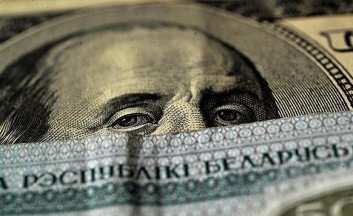Belarus fell into a ‘poverty trap’
 The situation has not changed
The situation has not changed

Minsk City Executive Committee Chairman Ladutko said that unjustified pay rises in Minsk would not be tolerated.
In Belarus wages grow regardless of the current economic situation. Incomes are redistributed in citizens’ favour due to more attractive wages in the neighboring countries. Belarus is trapped in her own unreformed economy: if wages stop growing, labour outflow will increase, but the economy can no longer withstand the wage growth.
Preliminary data shows that the wage growth in the economy continued in June 2013, partly due to the vacation period. The economic situation does not correspond to the current wage growth. In January-April 2013, real wage growth was 122.9% while labor productivity growth in GDP was 103.5%. The recalculated GDP figures for income sources in Q1 2013 demonstrate that the share of compensation to employees relative to GDP has surpassed pre-devaluation Q1 2011. Belarus has lost its competitive advantages following the devaluation.
Current economic situation is caused by a number of reasons. Attractive salaries, particularly in Russia, have resulted in a significant labour outflow from Belarus. Vacancies in medical healthcare, transport and construction are filled by Ukrainians, Baltic States’ citizens, Armenians and even Vietnamese. Citizens are not willing to work for the same pay – the average wage in Belarus in late May 2013 was USD 575. Businesses are forced to raise wages in order to keep qualified staff.
Officials’ efforts aiming at limiting wage growth are clear. Consumer imports are growing, due to the population’s reorientation towards more costly consumer goods, which are not produced in Belarus. Businesses’ increased costs do not allow for rapid and flexible response to changes in the international economic environment, which results in decreased Belarusian goods exports even in the traditional markets. Nevertheless, current wages in Belarus are lower than in other countries and Belarusian specialists are leaving the country for the sake of greater pays. The country fell into a kind of a ‘poverty trap’ – it cannot continue raising wages due to the deteriorated economic situation, but it is difficult not to raise wages due to the greater skilled labour outflow, which may result in further economic decline and sliding into stagnation and the consequent loss of even a theoretical chance for growth in the future.
Thus, Belarus, thanks to the use of outdated approaches to solving economic problems and conservative management style rooting in the Soviet past, finds herself in a situation without any good ways out (within the current economic model). The authorities need to give businesses more freedom to drive the economy, but that is not feasible given the total domination of the state in Belarus’s economy and bearing in mind that business is treated as an inexhaustible source of solutions to various social problems.
Subscribe to our newsletter




Situation in Belarus
Constitutional referendum: main consequences


 Video
Video
How to count the political prisoners: are the new criteria needed?


 Video
Video
Paternalism In Decline, Belarusian Euroscepticism, And The Influence Of Russia


 Video
Video











